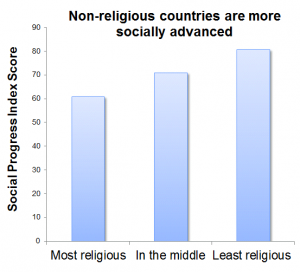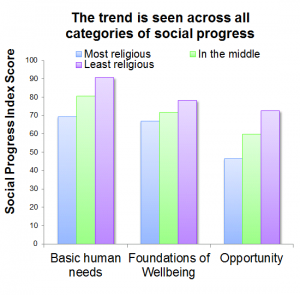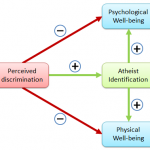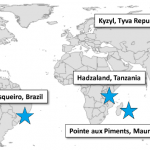 Yesterday the international polling organisation WIN/Gallup released the results of a massive new survey into religion worldwide (here’s their press release). You’ve probably seen the news reports, mostly talking about which countries have the most (or fewest) religious people, and speculating what that might mean.
Yesterday the international polling organisation WIN/Gallup released the results of a massive new survey into religion worldwide (here’s their press release). You’ve probably seen the news reports, mostly talking about which countries have the most (or fewest) religious people, and speculating what that might mean.
Some other important data come out just last week – the latest update of the Social Progress Index.This also is a mammoth undertaking, painstakingly assessing the nations of the world against a battery of benchmarks divided into three categories: “Basic Human Needs”, “Foundations of Wellbeing” (health and basic education), and “Opportunity” – personal rights, freedom, tolerance and advanced education.
So here’s the question. Are the two correlated in some way – and if so, how? I downloaded the data to find out.
Gallup surveyed 65,000 people in 65 countries, asking them a simple question: are you religious, not religious, or a confirmed atheist (or ‘don’t know) – Washington Post has the data. I pooled together the confirmed atheists with the not religious, to get the total number who are not religious. Some countries didn’t have full data in the Social Progress Index, leaving a total of 59.
I divided these 59 countries into thirds according to how ‘non-religious’ they are. In the top third, most people (60%) were not religious (The Wa-Po has a graphic listing 17 of them).
As you can see in the graph, the non-religious countries scored highest on the Social Progress Index, and the most religious countries scored worst.
This trend was apparent across all three categories. Non-religious nations were better at meeting basic human needs and providing the foundations o f wellbeing, and at providing freedom and opportunity. Nonreligious nations are simply more free.
f wellbeing, and at providing freedom and opportunity. Nonreligious nations are simply more free.
For those who care about such things, they were also linearly correlated, with an r2 of 0.4.
This analysis is brand new, never been seen before. But the general message – that regions with less religion are generally nicer places to live – is fairly well established now.
Back in 2009 I showed the less religious countries were also more peaceful, and research since then has shown that they are more democratic, have less corruption, more telephones, do better at science, have less inequality and other problems, and are generally just less dysfunctional and have better quality of life.
Now, there’s all sorts of possible explanations for this. I’ve long maintained that people turn to religion when their environment is stressful or uncertain, and that this explains why some countries are more religious than others.
However, it is also true that other factors, like exposure to diverse world views, are important. And, thinking about the Social Progress Index, you can easily imagine that having a religious majority could have a bad effect on personal rights, freedom and tolerance.
But whatever the explanation, there’s one clear take home, and it’s this. We really do not need to worry losing religion will cause society to crumble, as many claim. The evidence is overwhelming that the least religious societies do rather well.















